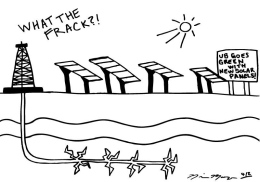 The University at Buffalo
(UB) has now entered into the controversial area of unconventional shale-gas drilling and hydraulic fracturing ('fracking') by sponsoring a newly-created "Shale Resources and Society Institute" (SRSI).
The University at Buffalo
(UB) has now entered into the controversial area of unconventional shale-gas drilling and hydraulic fracturing ('fracking') by sponsoring a newly-created "Shale Resources and Society Institute" (SRSI). Last week, SRSI released their first study, which is entitled "Environmental Impacts During Shale Gas Drilling: Causes, Impacts and Remedies". The authors stated strong conclusions, which were included in a UB news release (May 15, 2012), and subsequently made for some sensational newspaper headlines. However, others who have since examined the study indicated that the authors' conclusions are biased and not supported by the data (see below).
And that's not all. Initial examination of the background of the study's authors indicated close ties with the gas drilling industry. Also, the UB news release claim that the report was "peer-reviewed" was incorrect. Subsequently, UB retracted that claim in a revised press release. Then one of the so-called peer-reviewers distanced himself from the SRSI study. Finally, the authors did not disclose their funding sources. All of these issues made shale gas and fracking sensitive topics at UB, as documented in a post last week.
Shown below are excerpts of new reports with a link to each full report. These articles start with an editorial letter by me, and continue with detailed analyses of the SRSI report by others, which together provide independent views of flaws and industry-bias in the SRSI study and lead one to question the wisdom of UB sponsorship.
Shale study harms UB’s reputation, By David Kowalski, Letter to The Buffalo News, May 24, 2012
But the fact that all three authors have ties to the energy industry raises concern about conflicts of interest. Their report and undisclosed funding sources only reinforce that concern and harm the university.
They claimed that the decline [in environmental violations per gas well] was evidence for improved industry operations and state regulations. However, the authors completely ignored the fact that, as more wells were drilled over time, the total number of environmental violations increased by threefold.
It is a shame that this study was done under the aegis of UB. The university should protect its reputation and re-evaluate its sponsorship of the Shale Resources and Society Institute.
UB report on 'fracking' draws fire of watchdog, By David Robinson, The Buffalo News -- Front page story, May 25, 2012
A Buffalo-based corporate accountability research group Thursday criticized as "seriously flawed and biased" last week's study from the University at Buffalo that said stronger regulation was leading to an improved safety record among drillers in Pennsylvania's Marcellus Shale.
"The evidence does not support the notion that fracking is becoming any safer," the new study said.
"While masquerading as independent, academic research, the report's errors all point in the direction of heavy pro-industry bias and spin," the Public Accountability Initiative study said.
Critics question shale gas researcher, schools, By Kevin Begos, Associated Press, May 25, 2012
A well-known expert on the natural gas boom is again
facing criticism over his ties to industry and a lack of transparency in
how he presents work to the public, fueling debates over research
that's been published by major universities.
Timothy Considine was lead author on a shale gas report recently
issued by the University at Buffalo and a previous report from Penn
State University. Critics say both reports presented research in
misleading ways and failed to fully disclose funding sources.
Considine, now at the University of Wyoming, has gotten funding from
industry groups such as the Marcellus Shale Coalition, the Wyoming
Mining Association, the American Iron and Steel Institute, and the
American Petroleum Institute.
On Thursday, the Public Accountability Initiative, a Buffalo nonprofit, issued a critique of the UB study.
The University at Buffalo also said the report "was not funded or
commissioned by external sources." But Considine told The Associated
Press in an email that the University of Wyoming paid him and two other
lead authors.
Martha McCluskey, a University at Buffalo law professor who was on an
ethics committee there, said the new shale institute appears not to
meet disclosure provisions and hasn't gone through the standard process
for faculty approval and vetting of new centers and initiatives to
preserve academic integrity.
UB Pulls SRSI Website, By the Public Accountability Initiative, May 25, 2012 (updated May 26, 2012)
The University at Buffalo Shale Resources and Society Institute (SRSI), the subject of the analysis we released yesterday, has password-protected its website as of this morning. Notably, the SUNY Fredonia Shale Resources Institute also pulled its website recently after negative attention from Artvoice.
The Public Accountability Initiative saved copies of most of the SRSI’s web pages.
Update (5/26): The SRSI site is accessible again, and UB has issued a statement regarding the SRSI report.
Update (5/26): The SRSI site is accessible again, and UB has issued a statement regarding the SRSI report.








